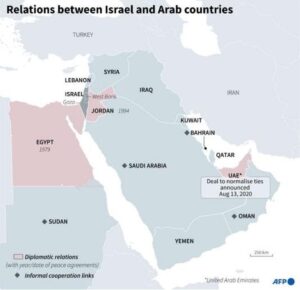The historic deal struck between two powerful nations of West Asia is important for maintaining and strengthening peace in the Middle East. The US President Trump has acted as the dealmaker. Expanded business and financial ties between the two thriving economies will accelerate growth and economic opportunity across the Middle East.
Dimensions
- Provisions of the Abraham Accords
- Why has UAE taken this decision?
- How does it alter West Asian Politics?
- How does it impact India?
Content:
Provisions of the accords:
- Israel’s ties with the United Arab Emirates (UAE) and the Kingdom of Bahrain was formalised on September 15th in the White House of the US through the historic agreement ‘Abraham Accords’, first Arab-Israeli peace deal in 26 years.
- The agreement with the UAE and Bahrain are ‘peace-for-peace’ deals without any physical quid pro quo by Israel.

- From now on Israel and the UAE will fully normalize their diplomatic relations.
- They will exchange embassies and ambassadors.
- They plan to sign bilateral agreements regarding investment, tourism, direct flights, security, telecommunications, technology, energy, healthcare and other areas of mutual benefit.
- Direct flights would begin operating between Tel Aviv and Dubai and Abu Dhabi, thus diversifying activities of both regions.
- There will be no embassy in Jerusalem until a final agreement is signed between Palestine and Israel.
Why has UAE taken this decision?
- The Trump peace plan for Israel and Palestine, announced early in 2020 theoretically allows Israel to annex its settlements in the West Bank.
- The UAE and other Arab countries have strengthened their contacts with Israel in recent years despite Israel’s deepening occupation of Palestine and the absence of any peace talks.
- This has suggested that the Arab countries are practically ready to live with the status quo of the occupation, which would change by annexation and might imperil the two-state solution for Israel and Palestine further.
- The Arab capitals under political and diplomatic pressure could be forced to take a harsher line towards Israel.
- This could also strain their ties with the US.
- By reaching an agreement with Israel in return for Israel’s suspension of its annexation plan, the UAE and its Gulf Arab allies have managed to save the status quo on Palestine.
- Another factor is that Israel and its traditional rivals in the Gulf have shared antipathy towards Iran. Both sides have benefitted from Trump junking the Iran deal and reimposed sanctions on Tehran. A formal agreement would help them face a defiant Iran together.
How does it alter West Asian Politics?
- Opening direct ties between two of the Middle East’s most dynamic societies and advanced economies will transform the region by spurring economic growth, enhancing technological innovation, and forging closer people-to-people relations.
- Due to formal diplomatic and business contacts, launching of flight services both countries could cooperate more directly in regional diplomacy.
- As there are assumptions that the deal was signed with the blessings of Saudi Arabia, the de facto leader of the Gulf Sunni kingdoms, the possibility of more Gulf countries following suit is more.
- This paves way for advancement of peace in the Middle East region.
- It would create an opportunity for Israeli and Palestinian leaders to re-engage in meaningful negotiations that will realize a two-state solution in line with relevant UN resolutions, international law, and bilateral agreements.
How does it impact India?
- India has welcomed the establishment of diplomatic relations between the UAE and Israel, calling both its strategic partners.
- But the Israel-Gulf Cooperation Council (GCC) ties may provoke new polarisations between the Jihadi fringe and the mainstream.
- Israeli foray into the Gulf has the potential to disrupt the existing politico-economic architecture India has carefully built with the GCC states.
- India has acquired a large and rewarding regional footprint, particularly as the preferred source of manpower, food products, pharmaceuticals, gem and jewellery, light engineering items, etc.
- Indians are also the biggest stakeholders in Dubai’s real estate, tourism and Free Economic Zones.
- But Israel has niche strengths in defence, security and surveillance equipment, arid farming, solar power, horticultural products, high-tech, gem and jewellery, and pharmaceuticals.
- Israel is known as the start-up nation and its stakeholders could easily fit in the various duty-free incubators in the UAE.
- Israel has the potential to supply skilled and semi-skilled manpower to the GCC states.
- Hence it is more important for India to manage the economic fallout of the Israel-GCC synergy.
- The establishment of new diplomatic relationships between Israel and UAE would be a game changer in war torn West Asia. Examine.
Approach to the answer:
- Write about the new accord
- Write in brief why UAE took this step
- Write how it alters West Asian politics and conclude the answer
















